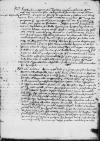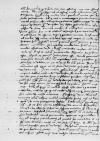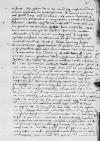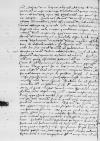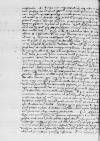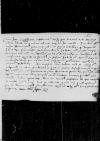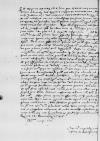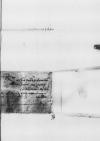⌊⌋ 25(!) praeteriti mensis Septembris de impetrata quadam in . commissione. Eius nunc exemplar mitto, ut eo melius Reverendissima Amplitudo Tua perspiciat, quam opportunum sit ac necessarium, ut . quibuscumque modis fieri possit, ⌊Π⌋ praecedatur. Ad haec quoniam praecipue in dubium vocabatur, an bulla ⌊Leonis⌋, quae Lutheranorum tantum meminit librorum, et qui ab ipso ⌊Luthero⌋ eiusque sectatoribus essent editi articuli, extendi quoque deberet in sacramentarios. Conventum est, quo longior disputatio tolleretur, ut ⌊Alexandri⌋ liber sacramentariae factionis, qui ⌊Romam⌋ missus et ab Alexandro perlectus notatusque est, ⌊magistro sacri palatii⌋, theologo primario, daretur, qui perscrutaretur, num in eo praeter sacramentariam haeresim et de Lutheranis articulis aliqui continerentur. (Tum enim negari non posse, si ibidem et isti reperirentur, quin bullae locus sit). Simulque suum proferret iudicium, quid privatim de ipsis annotationibus manu ⌊Alexandri⌋ adscriptis sentiendum esset. ⌊Is⌋ igitur postea, cursim perlecto libro, litteris authenticis manu propria scriptis reverendissimo domino vicario respondit, non eleganter quidem, sed candide et erudite hoc exemplo.
“Reverendissime Domine. Salutem. Percurrendo vidi, quae scribit perfidus haereticus ⌊Henricus Bullingerus⌋ super epistolas ⌊Pauli⌋ ad Romanos et Hebraeos, iuxta commissionem Reverendissimae Dominationis Vestrae mihi factam et ultra principalem haeresim de sacramento Eucharistiae, quod non sit ibi Christus, nisi in signo et ad memoriam, quo pessimo dogmate repetito millies respergitur et inficitur totus liber. Foedatur etiam aliis haeresibus, utpote negando, quinimo contemnendo summum pontificis primatum et potestatem secundum articulum ⌊Lutheri⌋ vigesimum quartum a ⌊Leone⌋ damnatum soli fidei, id est fiduciae in Deum iustificationem tribuendo secundum articulum decimum quintum eiusdem, pariter ab eodem damnatum, indulgentiis viliter detrahendo iuxta decimum sextum, et inde articulum eiusdem ab eodem pariter damnatum. Purgatorii despiciendo ignem, uti fabulam secundum trigesimum sextum ⌊Lutheri⌋ articulum pariter ab ecclesia per ⌊Leonem⌋ damnatum. Leges pontificias contemnendo super celebrandis festivitatibus secundum articulum ⌊Lutheri⌋ vigesimum sextum damnatum pariter a ⌊Leone⌋, ut non possit ignorantias opponere pro excusatione quisquis has haereses, veluti credendas signis marginalibus honoraverit, veluti quaedam notabilia prae aliis, eodem praeciso modo, quo notabilia quaedam inter catholica dogm[a]ta solent annotari et, qui hoc ipso libro usus est, fecisse deprehend[i]tur, ut ex his suspectus reddatur, quod ei placeant illa falsa aeque u[t] vera, qui talem librum signavit, salvo semper meliore iudicio Reverendissimae Dominationis Tuae.
Cui me plurimum commendo.
Valeat felix.
Ex ap[os]tolico palatio, 17 Octobris 1545.
Servitor frater ⌊Bartholomeus Pisanus⌋ ordinis praedicatorum, magister sacri palatii.”
Tantae auctoritatis et existimationis hic vir est, ut dubium non sit, quin hoc eius iudicium omnes iam sequentur.
De ω quid dicam? Is, acceptis litteris vocatoque me ad se, magno gaudio eas m[i]hi statim legendas et describendas dedit. Quamquam igitur ex solo hoc libro et iisdem litteris ⌊Π⌋ damnari et⌊ F⌋ decretum confirmare possit, id quod etiam paulo post omnino iam continget cum optatissim[o] et felicissimo . fine, tamen deliberatum nihilominus iudices habent, ut Π in carcerem reductum questionibus etiam suppona... secundum commissionis sententiam. Et haec quidem, si . non fuer[it] assecutus ⌊Π⌋. Posset enim eo res et protrahi, et non mediocriter interturbari. Promittit hunc sibi adeo certo ⌊Π⌋, ut de illo omnes iam ⌊Romae⌋ scire voluerit.
Atqui ego nondum mihi aliud persuadere possum, nisi vel negatum, vel huiusmodi verbis et condicionibus concessum iri, ut neque ⌊Romae⌋ illi quicquam profuerit, neque eius fiducia nimium hinc ad vos properaverit. Ex ⌊⌋ enim ... posterioribus 25(!) Augusti datis intellexi, quod Reverendissimae Amplitudinis Tuae exspectabatur responsum, quam certus tum pro sua prudentia ita responsuram, ut nisi ⌊X⌋ per vim prorsus libidini suae atque ⌊Π⌋ servire voluerit, cessatura sit ab hoc perverso patrocinio et de Π astus, qui alioquin admodum perniciosus fuerit, quemadmodum bis iam ante significavi, elidetur, quo nimirum hoc optimo causae statu ipsa iam tandem in urbe ⌊Roma⌋ optatum suum finem accipiat, ad quam ⌊Π⌋ potius profugere, quam coram ⌊regia maiestate⌋ se sistere voluit, licet non citatus tantum, sed etiam priore salvo conductu satis munitus fuisset. Binas hac de re, nulla interposita mora, litteras ad Reverendissimam Amplitudinem Tuam et M superioribus dieb[us] dedi. Quae si itidem tempori reddentur, plurimum spero ad praecidendum . afferent adiumenti.
Exspecto de his in dies singulos Σ et M litteras, quae si huiusmodi erunt allatae, quales ego magnopere cupio et rei necessitas postulare videtur, ad... denegato simpliciter + vel huiusmodi condicionibus appositis, quas non facile subierit ⌊Π⌋ neque adversum nos in iudicio detorserit. Non minus equidem gaudebo, quam si iam ipsa haec tota tragoedia eam, quam tot annis opperimur, nunc felicissimam consecuta esset catastrophen. Nunc enim proprie in hoc cardo vertitur, ut sic pauculos intra dies terminari possit, idque ut fiat, maximis certe laboribus nunc a me curatur. Quos Deus spero iam tandem etiam prosperabit, modo . fuerit sublatus.
. intermittere visum est, tantisper, dum . sit finita. Ab hac enim illa pendet, ita ut, cum ista finem acceprit, illa simul suum terminum consequetur. Quae omnia, quam vera sint, vel ex hoc Reverendissima Amplitudo Tua coniecturam fecerit, quod idem ⌊Π⌋ ne mussire, vel tantillum quidem agitare audeat in ea lite, quam . intendit. Videt enim ubique se superatum, et si usque ulla in lite progrederetur, mox contra se pronuntiatum iri.
Quod de frequenti ipsius missarum celebratione Reverendissima Amplitudo Tua intellexit, adeo falsum est, ut quamdiu ⌊Romae⌋ fuit toto hoc spatio, quod iam quinque annorum est, non solum numquam celebraverit, sed nec etiam sanctum Eucharistiae sacramentum suscepisse, vel confiteri sacerdoti visus sit. Quin et in templo rarissime videtur, quod si quando ingreditur, obambulationibus tantum et scurribus fabulationibus in ... vacat. Neque etiam certe clinicum medicum agit ⌊Romae⌋ (quod ... quis Reverendissimae Amplitudini Tuae falso indicaverit), sed in turpissimis quibusque causis et impiis improbum nebulam non tam vincendi causa, quam quaestus et favoris quorundam conciliandi. Quod iam Polonorum aliquot non sine magno suo detrimento experti sunt.
Scripsi in superioribus meis, quod . tantopere obtinere eiusque fiducia in Prussiam redire cupiat, inter ceteras hanc quoque non minimam esse causam, quia lupae et nothorum suorum desiderium diutius ferre nequeat. Hoc iam re ipsa satis declaravit. Ob id enim maiorem natu Iulium nomine ad se ⌊Romam⌋ vocavit. Qui ante pauculos dies huc venit comite quodam Iacobo Brauer, quem ex ... lupae istius natum comperi. Cumque ambo ad duos tresve dies hic iusserit commodati, testes eos inducere secundum se cogitaverat, putans me eorum condicionem ignorare. Postea autem hoc melius intellecto pro sua iustitia maxime illud cavit. Non enim absque magno ipsius malo testimonium illi dixissent. Quid cumque contra nos, quid non contra ipsum he...ficari potuissent. Ad quod a me egregia parata erant iuxta praxis formam interrogatoria. Adeo quippe, ut no[n] aeque optarem, quam ut iidem isti testes producerentur, id quod adhuc, ut fiat, omnibus modis et industriae nervis pro....
Venit praeterea huc ante triduum nepos J Albertus Gise no[mi]ne adolescens, ut apparet viginti quattuor annorum, Lutheranis ... ad ambas usque aures imbutus. Qui, etsi neget se recta ex Prussia huc profectum, tamen quoniam parum gnarus, quod mendacem memorem esse oportet, multa iam huiusmodi coram multis effutivit, unde plus quam evidenter constat non solum recta ex Prussia, sed etiam properanter ⌊Romam⌋ profectum esse. Apud ⌊Π⌋ primum diversatus est, deinde quoniam angustia domus illum non capiebat, altera quadam p[ro] diversorio utitur et ex Π consilio omnia gerit. Bene etiam nummatus est. Quae res etiam facit, ut satis splendide largeque voluptuetur. Inter cetera prolocutus est Reverendissimam Amplitudinem Tuam aliquot diebus incommode valuisse. At modo optime hac re, de qua invaletudine nihildum quidem intellexi, […] valuisse autem summa cum laetitia accepi Deoque gratias egi, ita ut hoc nomine etiam summo desiderio exspectem Reverendissimae Amplitudinis tuae litteras. A qua cum nullas mihi iste idem Albertus attulit, indicium est, quod admodum exigua neque satis since[ra] sit inter Σ et J amicitia. Causam vero illius adventus aliam adhuc nullam indagare potui, nisi ob litem, quam J cum ⌊Plemiensci⌋ habet. Sciam tamen paulo post omnia. A ⌊Π⌋ haec cautio adhibetur, ut raro cum ipso publice obambulet, ideo fortassis, ne suspicio oritetur J, clam Π [par]tes tueri. Sed quid hoc certius atque utinam non ob factionis similitudinem, cuius permulta exstant argumenta. S[ed] haec ad tempus patitur Deus et quantum his iuvabitur ⌊Π⌋, r[es] ipsa mox docebit, modo non, ut saepe iam dixi, . illum per summam fraudem petitum tulerit. Nihil enim fuerit pernicios[ius]. De quo hactenus satis.
Ceterum, quoniam divina grati[a] duo mihi in Reverendissimae Amplitudinis Tuae ecclesia obvenerant canonicatus et ... longum fuerit domini ⌊Pauli Snopec⌋ procuratorium exspectare (de quo in posterioribus meis fusius scripsi), malui ad Ψ supplicationem V nomine modo ad Reverendissimam Amplitudinem Tuam expeditam mittere. Bullam autem, quae maiores requirebat sumptus, intermisi in spem veniens, quod ea in re bullam P non requiret. Nam domino ⌊Mauricio Ferber⌋, qui praesens adhuc residet aliisque nonnullis ad solam huiusmodi resignationis supplicationem idem P possessionem dedisse constat. Verum quoniam magis fieri posset, ut clariorem consensum meum requireret, ideo ad hoc studiose compositas litteras ad V dedi, quas tum in P, cum manifestior consensus meus requisitus fuerit, producet, non autem antea. Sunt enim causae, quas longum esset recensere, cur haec cautio sit adhibenda. Quae tamen si adhiberi non poterit, cautum nihilominus et mihi, et V satis erit.
Decanatus Kielcensis canonicatusque Wladislaviensis possessionem absque molestia spero Ѧ assequetur. Scripsit enim de hoc serio ad ⌊F⌋ B et alii nonnulli cardinales atque adeo ego ad L et M. Quod si erit, habebit statim eundem canonicatum Wladislaviensem Y et decanatum Φ. Quamobrem supervacaneum non fuerit, ut Σ quoque ad L et M, et ipsum quoque ⌊F⌋ commendaticias pro Ѧ daret litteras, quo is tanto facilius in possessionem utriusque sacerdotii mitteretur. Tanto citius enim, ipso resignante, illi succederemus.
In Lubicensi ecclesia nondum est possessionem etiam assecutus, quandoquidem vita iam functi sunt potiores amici eius, quos eo in loco habuit. Quamprimum autem id acciderit, quanta promptitudine eundem quoque canonicatum sit ei, cui Reverendissima Amplitudo Tua optaverit, resignaturus, ex illius aliquot litteris eandem cognovisse puto.
De Posnaniensi canonicatu scripsi itidem ad ⌊Ioannem Hartowski⌋, dominum ⌊Hosium⌋ et ⌊Thomam Conopniczki⌋, ut perscrutarentur, si possessionem eius Hartowski consequi posset, cum in illum fuerit ius a domino Upsalensi transfusum. Ferunt enim in ea ecclesia generis nobilitatem quattuor stemmatis ante probare necessum habere, qui in canonicorum numerum est adhiben
<ten>
dus. Hoc si falsum aut contra hoc aliqua ratione nihilominus ad canonicatus istius possessionem venire poterit, et praesertim, quod nunc herus eius ad Cracoviensem evectus episcopatum maiore pollebit auctoritate et potentia, erit et ipsius rebus ampliter provisum. Valde op[i]mus enim est is canonicatus et dominus Upsalensis resign[a]tionem eius non recusabit.
Quem ex concilii loco, ubi a[d]huc sospes agit, frequenter Reverendissimam Amplitudinem Tuam litteris suis ivisere arbitror eaque omnia significare, quae indidem at[que] passim in ⌊Germania⌋ accidunt. Sed quoniam hactenus nullis illius ex eo loco datis Reverendissima Amplitudo Tua, quod sciam, respondit, et ipse, et ego veremur omnes esse redd[i]tas. Me vehementer diligit ac in omnibus rebus suis ⌊Romae⌋ agendis opera mea atque consilio utitur. Cui etiam magna certe diligentia et fide obsequor. Quo fit, ut sua sacerdotia, et ad quae ius habet, nostro quasi mutui permiserit. Quem si Deus unacum Reverendissima Amplitudine Tua nobis diutissime incolumem conservaverit, magnam h[anc] afferet nobis utilitatem. Sunt enim prae foribus certi casus, qui id copiose pollicentur, si aliquando contigerint.
Similiter reverendus L freqenter ad me scribit de omnibus et suis, et suorum negotiis, quae ⌊Romae⌋ expedienda s[unt]. A quo superiore hebdomada etiam litteras habui in re val[de] ardua, quam me voluit, cum O+ oratore apud B e[t] Q curare eo, quod in ea ⌊X⌋ adversariam habet. Scripsi autem O+ manu propria miro studio et amore pro L et orator eius summam diligentiam una mecum adhibet, ut pro desiderio L omnia et obtineantur, et conficiantur. Quod futurum etiam nihil ambigimus et me in m[ag]na gratia apud L certo ponet. Tractatur tamen, u[t] necesse est, admodum caute et tacite suppresso ubique ⌊X⌋ [no]mine, quo obscurius sit illam oppugnari faciliusque, qui[d] petitur, feramus. Scribit idem L in suis litteris simula[tque] ⌊Cracovie(nsis) ep(iscopu)s⌋ renunciatus fuerit, per me esse confirmat[io]nem suam expediturum. De quo novas ab eo litteras exsp[ecto] in horas.
Fit igitur, ut in tot rerum atque negotiorum tractatione perpetuo sim occupatissimus et rarius queam ad Reverendissimam Amplitudinem Tuam scribere, idque etiam brevius, quam superioribus temporibus consueveram, quando eram paulo liberior. Dabit itaque veniam mihi Reverendissima Amplitudo Tua et hoc, quod a me praestari potest, boni consulet. Dabitur a me omnis opera, ut litibus universis tandem aliquando feliciter finitis cunctisque istis L negotiis optime confectis ex Dei gratia et ipso clementer adiuvante et ad Σ, et ad L laetus, gratusque hospes brevi revertar. Quod maiore etiam gaudio sum facturus, si iis sacerdotiis, quae supra commemoravi, vel aliis etiam, si usuvenerit V, Y, ⌊Lemanni⌋ et ⌊Hartowski⌋ rebus pariter fuerit provisum. Vehementissime enim illud desidero et interea, ut fiat, omnibus modis elaborabo.
De ⌊Lemanno⌋ huc mittendo valde mihi probari Reverendissimae Amplitudinis Tuae consilium ante scripsi. Sive enim ⌊Π⌋ me discedente manserit, sive accepto . citius atque ego hinc profectus fuerit, necessarium erit ob varios rerum eventus, ut quempiam ⌊Romae⌋ fidelem ad manum habeamus. Qui quo maturius huc venerit diutiusque apud me manens pluras didicerit cognoveritque, hoc id melius futurum. Sumptuum illi subministrandorum non admodum difficilis ratio fuerit. Si enim P eos recusaverit, aucto in eo numero meo aliorumque adventu, facile illud tum induci possem, credo, ut contribuat. Sin minus, mihi atque V de nostrorum canonicatuum reditibus tantum superfuturum dubitare non possum, ut ⌊Lemannum⌋ hoc loco absque molestia sustineamus. Opere pretium autem iudico, ut minimum sex septemve mensibus discessum meum antevertat, ut et loca vicosque urbis, et personarum nomina, et officinarum atque expeditionum rationes memoria et intellectu compraehendat me demonstrante. Quin et alia quam plurima sunt scitu adeo necessaria, ut me illis parum nobis hic profuerit, quae a me quidem in ea hoc primo anno male didicerit, in usum iis converterit, sine me autem vix post quintum quartumve annum. Adhaec, ut et linguae aliquid addiscat et victus rationem, et eorum negotiorum tractationem, quorum causa huc mittitur utique opus est, quod etiam non parum tem[po]ris exigit.
Quotquot ⌊Romam⌋ veniunt, annos aliq[uot] ibidem commoraturi fere observant, ut sub autum[no] ⌊Italiam⌋ attingant, quando solis aestus defervuit et, frigerato iam caelo, magis quadrare incipit Aqui[lo]narium hominum corporibus. Qui, cum nec sitim ferre, [nec] famem didicerunt et a fructibus difficile sibi temp[e]rant, utplurimum in aestate variis morbis afflicta[n]tur et difficile curantur. In hieme autem minore pe[ri]culo hic suo more vivunt et, pedetemptim huius lo[ci] temperatiorem victum addiscentes, simul ad aestu[m] ferendum consequentis aestatis assuefiunt, quod, si ⌊[Le]mannus⌋ quoque observare poterit, non est contemnend[um], cum . ad extremam executionem iam progressum a[r]bitror.
Nam quod hoc et legitime fieri posset, et [con]tra absentem etiam adversarium occupatis bonis illi[us] hereditariis et sepe, et pridem scripsi. S tamen mihi significavit in suis apparuisse tandem T ⌊G[da]ni⌋ ibique nunc vitam agere. Proderit hoc ad facilio[rem] executionem, et praesertim, si et ⌊F⌋ mandata sua ad[di]derit, ob quae magis verebuntur gentiles nostr[i] ⌊Apostolicae Sedis⌋ diplomati suam negare auctoritatem. Perquam opportune accidet, si pro reditu meo ab advers[a]rio isto totum extortum fuerit, quod mihi expensarum [ac] fructuum nomine debetur. Est enim, ut Reverendissima Amplitudo Tua saepenumero ex meis scriptis intellexit, non pa[r]va pecuniae summa. De quo, et quid in R negoti[o] egerit Reverendissima Amplitudo Tua acceptis bullis et instrument[is], quae miseram, exspecto cotidie eiusdem Reverendissimae Amplitudinis Tuae l[itte]ras.
Calculum nondum describere potui, cum tantum otii hactenus non habuerim, ut id faciam aut primo quoque te[m]pore, quod a negotiis mihi superfuerit et ipsa futura aegestas per se me satis coget, in quam alioqui cadam, s[i] rationaria a me tempestive Reverendissima Amplitudo Tua non acce[perit].
Exemplum earum facultatum, quibus utitur apostolicus quidam nuntius in ⌊Germania⌋, quem + somniat, √ contulisse )I non visum est expedire, quod eius tota expeditio vix quattuor absolveretur ducatis eoque nec R, nec nos opus habeamus. Certus sum enim, qui istarum facultatum diploma unacum procuratoribus meis legi eas sese in Prussiam usque et ad ⌊ecclesiam Warmiensem⌋ minime extendere. Sed ad eam tantum ⌊diocesim⌋ seu provinciam, ubi nuntium pro tempore morari contigerit. Quod cum Reverendissima Amplitudo Tua X vel .-i responderit, si se illi forsan iis facultatibus et cesso iure )I tueri voluerint, quando R in √ possessionem missura est, nam Reverendissimae Amplitudini Tuae, neque R sed . aut + huiusmodi authenticum exemplar in P producendum est et tam lata nuntii potestas probanda. Quod si fuerit fortassis productum, deprehendet Reverendissima Amplitudo Tua legendo eas facultates ita terminatas esse, quemadmodum supra dixi. Illis itaque reiectis et quicquid praeterea forte de cesso sibi a )I iure bullarum vel instrumentorum . produxerit, tamquam nullius momenti rebus ipsoque . a √ remoto intrepide Reverendissima Amplitudo Tua R in possessionem mittere pergat, eo tamen modo, quo in prioribus meis litteris copiosissime est annotatum et demonstratum.
Cum α res etiam non videtur spernenda, dum certa est et iure potest fieri. Commode autem illi ⌊Lemannus⌋ adversarius dabitur, quando ipse ⌊Romae⌋ aderit et ego sospes ad Reverendissimam Amplitudinem Tuam rediero, quo et recto ordine, et minore tumultum fiant omnia. Minore multo negotio et sumptu ille propelletur, quam T est eiectus.
Verum tamen, quamdiu ⌊Π⌋ ⌊Romae⌋ manserit indemnatus litesque cum illo finem non acceperint, desideratum discessus meus ex hoc loco periculo non careret. Atqui tenet me haec firma spes utrimque iam tandem hoc optimo rerum statu paulo post futurum miserante et opitulante Domino Iesu.
. si vitam amiserit, quid sine mora curandum, Reverendissima Amplitudo Tua pridem cognitum habet. A me itidem nihil hic praetermittitur. De nominationibus duabus ad Reverendissimam(!) Amplitudinis Tuae ecclesiam quoniam diligenter ad me L et F ad B scripsit. Factum est, ut obtinerentur, quas pauculos post dies expeditas ad L mittam. Altera ⌊Christophoro Conarski⌋ cedet, altera nescio cui. Interponam autem meas maximas preces apud L et M, ut vel ⌊Langhannio⌋ nostro, vel ⌊Hartowski⌋ detur. Spero impetrabo.
De P erga me ingratitudine atque adeo crude[li]tate frustra iterum apud Reverendissimam Amplitudinem Tuam quererer. Exp[li]cari tamen nequit, quantopere me torqueat, cum et iure ...ud cautum et in statutis absque dubio etiam excepti sint, qui P [ne]gotiorum causa absentes fuerint praescriptumque residentiae tempus propterea explere non possent. Quid statutorum solut... etiam a me exigitur, qui pro septem annorum labore mer[ce]dem nullam tuli? Quin et de . reditibus idem P ita obscure Σ respondit, ut ex earum litterarum exemplo, quod ad nos Σ miserat, intelligere non potuerimus non solum, an id, quod in gymnasio studentibus solet, sed nec an omnino aliquid . solvere vellet, cum tamen ipse et statut... persolvit, et residentiae tempus complevit. De quo mer[ito] P rescripsit idem .. Ego autem, ne diutius surdis frustra c[a]nam, statui privatam hanc iniuriam meam patienter ferre, quamdiu Deus voluerit.
Fieri non potest, quin singuli ..., qui tam pauci sunt et amplissimis reditibus soli potiu[ntur] et a quamplurimis iam annis, infinitam depositam habeant pecuniam. Sed quoniam ecclesiastica est, in qua nemo pro[spe]ratur neque heredes, an ipsi Deo cariores erunt exitus, cred... probabit, praesertim cum illis nihil sit etiam restrictius. Non in[vi]deo illis tantas opes neque certe mali quicquam opto, sed ta[men] tum erga me ipsos paulo clementiores et aequiores esse velim, cum sine ullo suo detrimento possent, et ne divitiis ta[n]topere cor apponerent, ut in terra potius, quam in celo thesauriz[are] se viderentur contra doctrinam Christi. B prae ceteris ut... maiorem laudem meretur ob domum, quam de superfluo construit. Quamquam enim satius fuerit eam ex vivis paup... lapidibus aedificare, tamen quod minus bonum est, etiam bo[num] est, proderit enim ecclesiae. Scribit ei impraesentiarum .. Ego s[i] quid potero, nescio. Salutari autem eum meo nomine cupio, videtu[r] enim sincerior aliis nostrique studiosior.
Cum ⌊Absolom[e] Reyman⌋ quid actum sit, ignoro. Cui, acceptis ab eo litteris ⌊A[u]gustae⌋ circa finem Iulii datis, responderam mox primis v[e]redariis, mittens pariter ad illum formam rescripti, quod in rem eius hic impetrari posset, ut si placeret, de eo m[e] vicissim certiorem faceret, velle me tum huiusmodi rescriptum exp[e]ditum ad se mittere, quocumque iusserit. Eius rescripti for[mae] is erat sensus, ut committeretur a ⌊Sede Apostolica⌋ Reverendissimae Amplitudini Tuae, vel aliis aliquibus iudicibus, quos sibi ⌊Absolon⌋ delegisset, quo citata muliere personaliter, aut si id tuto fieri non posset, per affixionem citationis ad valvas ecclesiae Regiomonti terminus eidem mulieri praefigeretur, intra quem docere opus haberet matrimonium ante concubitum sibi ab Absolone sponsum esse, sicque Lutheranismo imbutam non esse neque in eo velle vivere legitime et sufficienter probare. Nam etiamsi vel maxime sponsio, quam praetexat mulier, accidisset, tamen haereticam mulierem ut quis ducat, non solum cogi non potest, sed etiam ...bus expresse prohibetur. Quo termino elapso si mulier per se aut procuratorem suum legitimum non compareret nec utrimque satis doceret, iudex tum absolvere ⌊Absolonem⌋ et perpetuo liberum ab hac muliere pronuntiare facultatemque aliam ducendi concedere posset quodque interim intacta manerent bona et possessiones Absolonis universae. Sed hactenus ab ⌊ipso⌋ responsum nullum accepi. Si in ⌊Prussiam⌋ redierit, vel alicubi in ⌊caesaris⌋ aula adhuc haeret, me clam est. Huc rumor allatus est occidisse .. Id, si verum, et ⌊Absoloni⌋ plurimum proderit, et toti fortassis etiam ⌊Prussiae⌋ et catholicae in ea religioni. Certum autem ex Reverendissimae Amplitudinis Tuae litteris, spero, brevi cognoscam.
Proficiscitur hinc quidam Iosephus Jasschinski archidiaconus Vilnensis, cui ad Reverendissimam Amplitudinem Tuam libellos duos sine litteris (quoniam lente iter faciet) ⌊Cracoviam⌋ usque in domum domini ⌊Georgii Hegel⌋ ferendos dedi. Alter est de auctoritate ecclesiae elegantissima phrasi compositus, alter huiusmodi habet inscriptionem: “Controversiarum praecipuarum in comitiis Ratisponensibus tractatarum, et quibus nunc potissimum exagitatur Christi fides et religio, diligens et luculenta explicatio per Albertum Pigghium Campensem”. Hi, si Reverendissimae Amplitudini Tuae ante visi non sunt, placitivos eos sibi et utiles futuros non dubito propter vicinos haereticos, qui in illis luculenter confutantur. B, intellecta morte G, neptem quandam suam ei substituere in animum induxerat, haud scio, an non N admonente, quo toties negata purpura, vel hoc modo nihilominus potiretur, et quantum coniectura assequi possum, vel B, vel Q hac de re iam ad X scripsit. Quin paratus quoque iam erat nuntius ad X, qui postridie, quam de N morte allatum erat, hinc per equ{u}os dispositos egredi debuerat, sed N morte comperta retentus est. Atq[ui] mihi videtur, etiam si vel maxime supervivisset unaque cu[m] X omnes industriae nervos intendisset perficere, tamen hoc [ma]trimonium non potuisse, verum potius cachinnum apud omnes regni proceres concitasse. Ego illud quamprimum subolfece[ram], ad L scripsi, et ipsum hoc idem cum Σ communicasse puto non sine risu. De quo ab L exspecto responsum.
Ad co[n]cilium Tridentum plures hinc proficisci ⌊pontifex⌋ iussit sub maximis poenis atque adeo omnes, qui residui manent, episcopos, nam eius prosecutionem plane iam certam esse credunt. Pro cuius inchoatione Natalis Christi etiam constitutus sit. De quo plura scribet dominus Upsalensis.
Pestis in ⌊Gallia⌋ mirabiliter grassatur, quo accedit, quod his diebus praeter al[ios] homines circiter duo millia procerum et nobilium ⌊Gallorum⌋ caesa f[e]runtur ab ⌊Anglis⌋. Videtur Deus insignem ⌊Galli⌋ perfidiam et grande scelus ex inducto in Christianitatem ⌊Barbarossa⌋ conflatum plectere et ulcisci. Det tamen idem ipse Dominus m[eli]ora. Fusos enim populus apparet, cum haec regis sint facinor[a].
Cum ⌊duce Brunswicensi⌋ quomodo res acta sit, aliunde ad Reverendissimam Amplitudinem Tuam et citius scribetur. Magnam de illo spem conceperant, qui catholicam religionem tuentur, Deus autem aliter direxit negotium, forte ut vel diutius per hoc pes... ferum genus haereticorum nostra puniat peccata, vel alio m[o]do opem ferat afflictissimae ecclesiae suae contra illos, ne qu... superbiens dicat. Manus nostra excelsa et non Dominus fec[it] haec omnia.
Haec sunt, quae impraesentiarum mihi scribend[a] occurrunt, nam nec in novis modo apud nos quicquam praeterea circumfertur. Dominus Iesus in perpetua incolumitate ac suma rerum omnium felicitate ⌊ecclesiae Warmiensi⌋ ⌊totique Pr[us]siae⌋ et catholicae religione(!) et nobis omnibus custodiat Reverendissimam Amplitudinem Tuam.
Cui me humillime ac studiosissime commendo.
